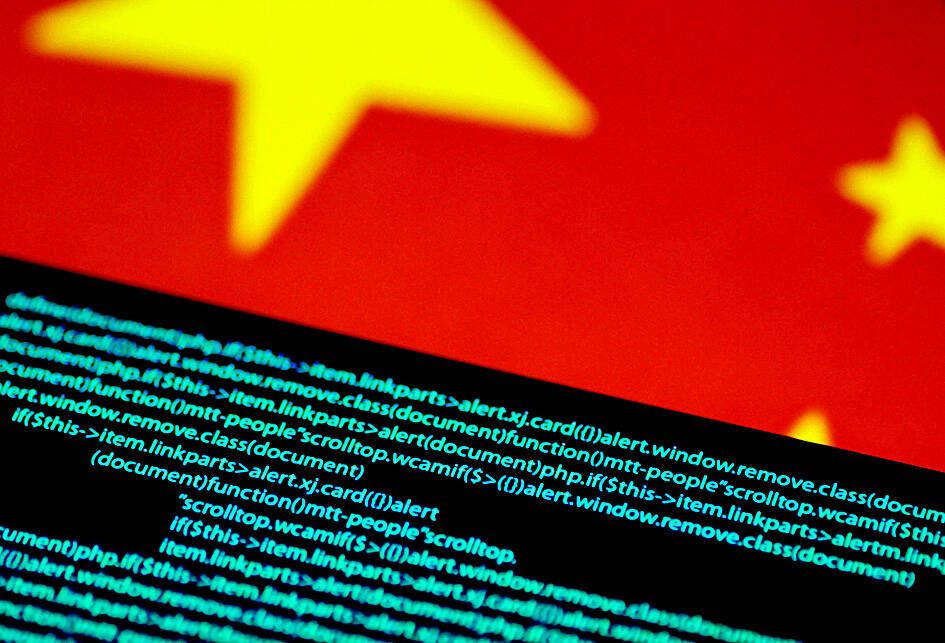National security authorities have uncovered a Chinese cyberoperation to flood the Facebook accounts of President Tsai Ing-wen (蔡英文) and former premier Su Tseng-chang (蘇貞昌) with derogatory comments.
The government found 825 Facebook accounts run by China’s cyberarmy that posted large numbers of anti-government comments on Tsai’s and Su’s Facebook pages, a national security source said on Saturday, asking to remain anonymous.
The accounts were found to be part of China’s cognitive warfare operations that aim to deride Taiwan’s government over its close ties with the US.

Photo: Reuters
One comment repeatedly made by the accounts was: “Taiwan wants to become ashes of war by acting like Ukraine to fight for the US.”
Another commonly repeated comment said that the Tsai administration had bitten off more than it could chew by siding with Washington against Beijing.
One of the Chinese accounts identified themselves as “Yanchun Song,” who appeared to run a media planning company in Liaoning Province in northeast China, the national security source said.
Security authorities identified Song as the president of Dandong Bokai Advertisement Planning Co (丹東博凱廣告公司) in Liaoning, the source said.
China has long used its cyberarmy to disseminate misinformation through a step-by-step process in an attempt to manipulate public opinion in Taiwan, they added.
The first two steps are creating fake accounts to post misinformation and then using Facebook pages run by people overseas to share the misinformation, the source said.
The third step is to use several dummy accounts to spread the false information, they added.
The final step is to share those accounts on Facebook groups commonly used by Taiwanese in a bid to generate clicks, create controversy and draw attention to the misinformation, the source said.
The model is aimed at “brainwashing” Taiwanese with the goal of defeating the enemy without having to use force, they said.
The source accused China’s cyberarmy of using similar tactics and attacks during Taiwan’s local government elections in November last year, and said that their next target could be next year’s presidential and legislative elections.
China’s cyberarmy could try to exploit several issues ahead of the elections to try to convince Taiwanese that the government is doing a poor job and that war across the Taiwan Strait could break out soon, the source said.
Among the issues that could be exploited are China’s import bans on Taiwan’s agriculture and fishery products, Taiwan’s wide wealth gap, China’s military drills and expensive US arms sales to Taiwan, the source added.
China could also spread the idea that Washington would abandon Taipei in a war with Beijing, they said.
Academia Sinica’s Institute of European and American Studies in a recent study found that China’s cognitive warfare against Taiwan was becoming more diverse, expanding from efforts to influence via mostly personal bilateral exchanges to online propaganda.

NATIONAL SECURITY THREAT: An official said that Guan Guan’s comments had gone beyond the threshold of free speech, as she advocated for the destruction of the ROC China-born media influencer Guan Guan’s (關關) residency permit has been revoked for repeatedly posting pro-China content that threatens national security, the National Immigration Agency said yesterday. Guan Guan has said many controversial things in her videos posted to Douyin (抖音), including “the red flag will soon be painted all over Taiwan” and “Taiwan is an inseparable part of China,” while expressing hope for expedited “reunification.” The agency received multiple reports alleging that Guan Guan had advocated for armed reunification last year. After investigating, the agency last month issued a notice requiring her to appear and account for her actions. Guan Guan appeared as required,

Japan and the Philippines yesterday signed a defense pact that would allow the tax-free provision of ammunition, fuel, food and other necessities when their forces stage joint training to boost deterrence against China’s growing aggression in the region and to bolster their preparation for natural disasters. Japan has faced increasing political, trade and security tensions with China, which was angered by Japanese Prime Minister Sanae Takaichi’s remark that a Chinese attack on Taiwan would be a survival-threatening situation for Japan, triggering a military response. Japan and the Philippines have also had separate territorial conflicts with Beijing in the East and South China

A strong cold air mass is expected to arrive tonight, bringing a change in weather and a drop in temperature, the Central Weather Administration (CWA) said. The coldest time would be early on Thursday morning, with temperatures in some areas dipping as low as 8°C, it said. Daytime highs yesterday were 22°C to 24°C in northern and eastern Taiwan, and about 25°C to 28°C in the central and southern regions, it said. However, nighttime lows would dip to about 15°C to 16°C in central and northern Taiwan as well as the northeast, and 17°C to 19°C elsewhere, it said. Tropical Storm Nokaen, currently

PAPERS, PLEASE: The gang exploited the high value of the passports, selling them at inflated prices to Chinese buyers, who would treat them as ‘invisibility cloaks’ The Yilan District Court has handed four members of a syndicate prison terms ranging from one year and two months to two years and two months for their involvement in a scheme to purchase Taiwanese passports and resell them abroad at a massive markup. A Chinese human smuggling syndicate purchased Taiwanese passports through local criminal networks, exploiting the passports’ visa-free travel privileges to turn a profit of more than 20 times the original price, the court said. Such criminal organizations enable people to impersonate Taiwanese when entering and exiting Taiwan and other countries, undermining social order and the credibility of the nation’s